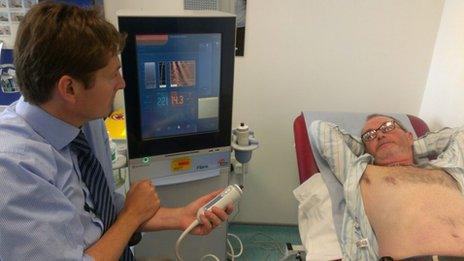Liver damage is 'silent killer' cirrhosis patient warns
- Published

The FibroScan is combating what Dr Wright describes as a "ticking time-bomb"
"A silent killer" - those are the words David Bull uses to describe his long-standing liver complaint.
Mr Bull, 53, from Hayling Island, near Portsmouth, visited his GP, complaining of fatigue, three years ago.
The former postman said: "I was told I had kidney stones - I later found out I'd got the early stages of cirrhosis, which was incidental.
"You don't know you've got it until it's almost too late. I'd no idea."
Mr Bull's condition is constantly monitored by Dr Mark Wright, a consultant hepatologist at Southampton General Hospital.
Up until earlier this year Mr Bull was assessed and diagnosed by biopsy, using a large needle pushed through the ribs, which would often have to be repeated for accuracy.
'Ticking time-bomb'
Mr Bull said: "The biopsy was very intrusive so it would mean going under local anaesthetic and spending the whole day in hospital."
But now the hospital has The FibroScan, an ultrasound probe to diagnose what Dr Wright describes as the "ticking time-bomb" of liver damage.
A scan using the £80,000 equipment, which uses sound waves to assess the degree of tissue damage, takes about 10 minutes to complete and gives specialists an immediate overview of a patient's liver health through computerised images.
"With The FibroScan you're in and out in minutes and it's painless," the part-time musician said.
"I'm more careful about my diet now, I exercise regularly and I've not had any alcohol for about two and-a-half years," he added.
Dr Wright said: "A flick of the probe makes the liver wobble and the scan records how fast the wobble travels with ultrasound.
"The more scar tissue there is, the stiffer the liver, so instead of being like blancmange it's like gristle."
Fifth biggest killer
Deaths from liver disease have increased by a quarter in the UK in less than a decade.
Dr Wright, who is a spokesman for the British Liver Trust, continued: "We are sat on a triple ticking time-bomb of the consequences of alcohol, obesity and hepatitis which, if we don't intervene, will send things spiralling completely out of control.
"With advances in technology, such as The FibroScan, we are in a better position than ever to tackle this crisis head-on as we can quickly and accurately assess people early on, without posing any risks to their health or requiring them to stay in hospital."
Liver disease, the fifth biggest cause of death in England and Wales behind heart disease, cancer, stroke and respiratory disease, comes in more than 100 forms but is most commonly associated with alcohol abuse, obesity and viral hepatitis.
National screening programme
Inflammation and fibrosis - scarring - of the liver tissue, which affects about 10% of the UK population, can cause cirrhosis or liver failure and lead to cancer if diagnosis is delayed or if left untreated.
Dr Wright said: "Now is the time for serious consideration of the introduction of a national screening programme to allow us to step in early where we can and make a dent in the rising death rate before we reach a point over the next 20 years where we have lost all grip on control of the disease.''
The FibroScan, which was designed in France, has been installed at 12 hospitals across the UK.
About 90 patients have undergone the ultrasound probe since it arrived in Southampton three months ago, an average of about one a day. Ten patients were found to have cirrhosis.
"So far we've prevented 20 liver biopsies, which is a huge benefit to these patients and to the health economy," Dr Wright added.
- Published9 May 2012
- Published22 March 2012
- Published19 March 2012
- Published1 January 2012
- Published10 January 2012